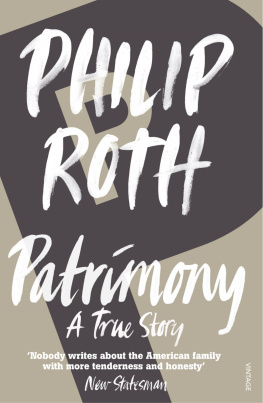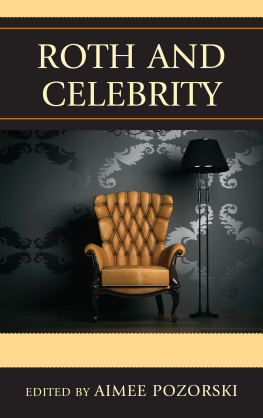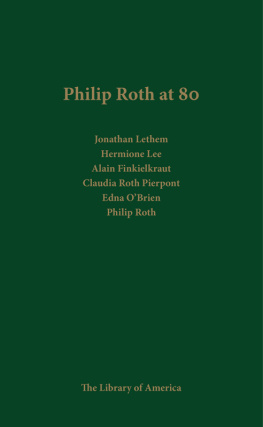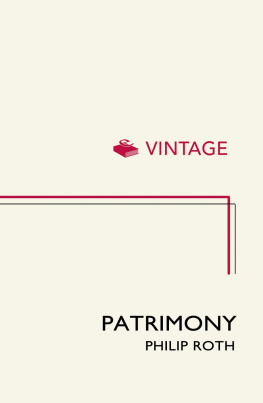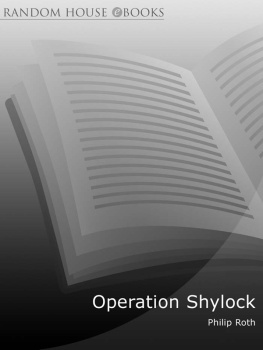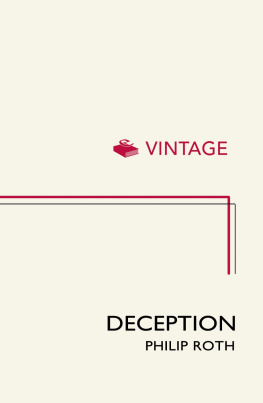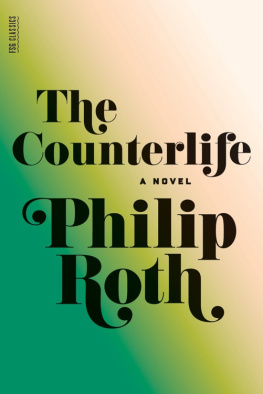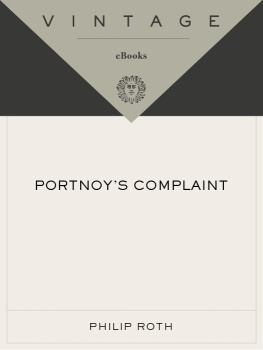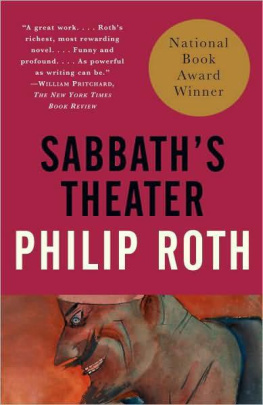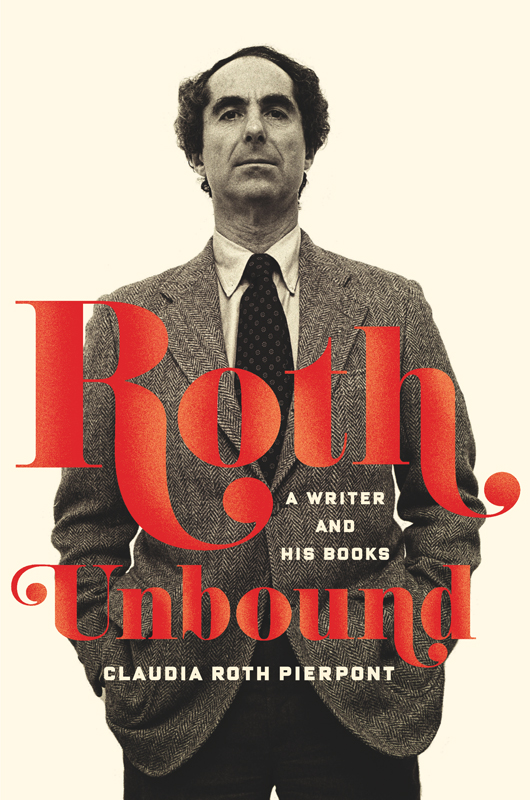
For Robert Pierpont
I believe that we should read only those books that bite and sting us. If a book we are reading does not rouse us with a blow to the head, then why read it?
Nathan Zuckerman, 1981, Zuckerman Unbound , quoting Franz Kafka, 1904, letter to Oskar Pollak
Contents
Introduction
I was leaving a crowded birthday party, in December 2002, when the host stopped me at the door and said that if I stayed he would introduce me to Philip Roth, whose work he knew I admired. The party was in a jazz club downtownthe thoughtful host and honoree was the jazz critic Stanley Crouchand Roth was seated at the bar, surrounded by people. With courage kindled by Stanley and a couple of beers, I went up to him and blurted out that I thought he was one of the great American novelists of the twentieth century. He smiled and said, But its the twenty-first century. Then he turned to Stanley, beside me, and said, You bring me these women and they insult me! We laughed and I said a few more things that I hoped were less embarrassing. And then I left. Roth has no recollection that this ever happened.
Almost two years later, I received an envelope in the mail with the name Philip Roth and a Connecticut address stamped in the upper-left-hand corner. Inside was a brief, typed letter on plain white paper, explaining the context of a photocopy also enclosed. Roth was writing in response to an article I had written in The New Yorker about the anthropologist Franz Boas, whose lifes work touched on some of the issues raised in Roths most recent book, The Plot Against America : the dangers posed by the American Right during the thirties and early forties and the battle against isolationism and bigotry, to state these issues very broadly and in terms that Roth did not use in the letter at all. The photocopy was of the front page of a long-forgotten newspaper called In fact edited by George Seldes, a left-wing maverick of sorts, Roth explaineddated November 17, 1941. Someone had sent it to him because it featured an article about Charles Lindbergh, who, in Roths counterhistorical novel, is elected to the American presidency. Roth was sending it to me because it also featured an article by Boas, and he thought that it might be of interest. He mentioned that his father used to get In fact and also I. F. Stones Weekly : Papers to stoke the indignation.
Readers of this book will learn that Roth not infrequently sends this sort of letter to people who have written something that piques his interest. I replied and he replied and we ended up meeting for coffee in New York City. My nervousness fell away immediately. Roth is a brilliant talker, but he also loves to listen: hes as funny as you might think from his books, but he makes people around him feel funny, toohe may be the easiest laugher Ive ever met. This turned out to be the first of many such meetings and discussions.
I am a journalist by profession but an art historian by traininghalf a lifetime ago, I wrote a dissertation in Italian Renaissance art history and spent long hours in European archives, searching for a single line that might add a scrap of knowledge or a shade of meaning to beloved subjects that had already been thoroughly researched. The smallest discovery was exciting: it felt like being in touch with history and with the worlds great artists; it felt like tugging back the curtain of time a fraction of an inch. And so, despite the easy camaraderie that Roth has inspired through roughly eight years of discussing books and politics and a thousand other things, it was not lost on me for a moment that being able to talk with Philip Roth about his work was an extraordinary privilege. On this subject, at least, I tried to keep track of everything he said.
I did not have this book in mind; I didnt have anything particular in mind. I reviewed one of Roths books for The New Yorker and eventually became one of several readers to whom he showed his new work before publication. (The first time he asked me to read a manuscript, I said, Id be honored. He replied, Dont be honored, or youll be no good to me.) This book began, in 2011, as an essay that was meant to be part of a collection on American subjects. But it kept growing, for two reasons principally: Roth has written so many books; and he was willing to talk with me about them, at length.
Roth Unbound is fundamentally an examination of Roths development as a writer, considering his themes, his thoughts, and his language. By necessity, it covers an enormous span, from his Newark childhood, during the Second World War, and the wholly unexpected outrage that greeted his early short stories, through the literary (and unliterary) explosion of Portnoys Complaint ; from the self-renewal of his experiences in Prague in the seventies and the imaginative fulfillment of The Ghost Writer to the series of masterworks published between the mid-eighties and the year 2000 The Counterlife , Operation Shylock , Sabbaths Theater , American Pastoral , The Human Stain and, finally, to his short, intense novels of the twenty-first century. Of course, this summary barely touches on the high points of a career that has spanned more than fifty years and many different phases. In 2006, when The New York Times Book Review conducted a poll among contemporary writers, editors, and critics to determine the single best work of American fiction published in the last twenty-five years, a Roth novel did not come in first only because the votes for his work were split among seven different books. Not since Henry James, it seems to me, has an American novelist worked at such a sustained pitch of concentration and achievement, book after book after book. And then there are the subjects: Jews in America, Jews in history, sex and love and sex without love, the need to find meaning in ones life, the need to change ones life, parents and children, the trap of self and the trap of conscience, American ideals, the American betrayal of American ideals, the upheavals of the sixties, the Nixon presidency, the Clinton era, Israel, the mysteries of identity, the human body in its beauty, the human body in its corrupting illness, the ravages of old age, the coming of death, the power and failings of memory. Its a wonder this book isnt a lot longer.
Roth finished Nemesis in the fall of 2009, and he soon realized, even if the public did not, that it would be his last novel. A literary study like this could only have been written since then, with the full arc of Roths work completed. But Roths retirement is also a precondition for the somewhat hybrid form this book has taken, because of his own considerable contributions to its pages: memories, observations, opinions, thoughts and second thoughts, jokes, stories, even songs. Unless another source is noted, all quotations in the following pages are derived from my conversations with him. (Likewise, the remarks of various friends come from my interviews and conversations with them.) To put it simply, he had the time to talk about his work because he wasnt doing it anymore. And it was exciting to him to look back on a lifetimes production that even he had not yet had time to sum up, beyond citing his heavyweight hero, Joe Louis, on retiring: I did the best I could with what I had.
Roth has been extremely generous. He has answered many, many questions. He has let me prowl through the files in his attic in Connecticut. I have talked to him long enough, and through sufficiently different circumstancesin sickness and in health, literallyto hear changes in opinion, and I have tried to account for these changes, too, aware of the hazards of setting down a passing thought as the permanent record. And he has done all of this with the understanding that he would read not a single word in advance of publication. For one thing, he is beyond caring very much what people say anymore; hes had an earful. For another, he knows better than anyone that freedom is as essential to writing as to life. And so, while this book has benefited beyond measure from Roths presence, I have kept him resolutely out of mind when it comes to my critical task.


